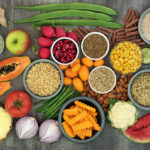Study finds prebiotics change brain’s response to food and help you lose weight
 (NaturalHealth365) For many health-conscious individuals, the concept of probiotics is far from unfamiliar. These beneficial microorganisms have long been hailed for their potential to promote gut health and overall well-being. However, the world of gut health is not confined to probiotics alone.
(NaturalHealth365) For many health-conscious individuals, the concept of probiotics is far from unfamiliar. These beneficial microorganisms have long been hailed for their potential to promote gut health and overall well-being. However, the world of gut health is not confined to probiotics alone.
Prebiotics, the lesser-known counterparts to probiotics, play a crucial role in nurturing the intricate ecosystem within your digestive system. They are a type of dietary fiber sourced from various plants and are particularly adept at fueling the growth of beneficial gut bacteria. But that’s not all. A recent study done by the University of Leipzig Medical Center and published in Gut states prebiotics alter the human brain’s response to food, assisting in the battle against weight gain.
Outsmart your brain with prebiotic-rich foods
The research reveals that the consumption of prebiotics has a notable impact on how the human brain reacts to dietary inputs. Additionally, the study authors stressed that prebiotic regimens are most likely to change brain responses to calorie-rich foods.
For those interested in leveraging prebiotics to support weight management and digestive health, it’s essential to understand that consuming the occasional apple or sweet onion won’t suffice. The study’s insights were derived from a group of 59 participants who consumed 30 grams of inulin daily over the course of two weeks.
During the study, participants were presented with images of various food items and asked to express their cravings. They were then given their most desired food and instructed to consume it. Four MRI scans were conducted during the study: one before the intervention, another after prebiotic consumption, a third before a placebo, and the final scan after placebo ingestion. The placebo had the same caloric content as the prebiotic-enriched food but lacked the prebiotic component. The results revealed increased prebiotic intake levels were associated with a reduced brain response to high-calorie foods.
The findings offer promise that a high prebiotic routine may potentially reduce or eliminate the necessity for more invasive treatments in the realm of weight management and obesity.
Top 5 prebiotic-rich foods to enhance your diet today
Prebiotics are indigestible fibers present in complex carbohydrates derived from specific vegetables and fruits. These fibers play a significant role in nurturing a healthy gut microbiota. Here are the top five prebiotic-rich foods you can incorporate into your diet to support overall well-being.
1. Apples: Apples contain prebiotics like pectin and polyphenols. Pectin, a soluble fiber, constitutes a substantial portion of the fruit’s fiber content. It helps cultivate a balanced gut microbiome, aids weight management, and reduces inflammation.
2. Asparagus: Asparagus is rich in inulin, a potent prebiotic that promotes digestive health and helps regulate insulin and glucose levels in the body.
3. Leeks: Despite their relatively small size, leeks pack a prebiotic punch with 100 to 240 milligrams of prebiotics per gram. They contribute to bone strength, enhance digestion, and reduce oxidative stress.
4. Onions: Onions, known for their robust flavor, are a prebiotic powerhouse. A mere four-ounce serving of onion provides an impressive 10 grams of prebiotics.
5. Garlic: Garlic supports a healthy gut by promoting the growth of beneficial Bifidobacteria, which contributes to a well-functioning digestive system. Its prebiotic properties also help inhibit the proliferation of disease-promoting bacteria.
Incorporating these five prebiotic-rich foods into your daily diet can enhance your gut health, well-being, and overall vitality. With the dynamic interplay of probiotics and prebiotics, you can take charge of your health and well-being on multiple fronts.
One final note, we would suggest you always pick out organic produce to avoid the unwanted toxic chemicals associated with non-organic foods.
Sources for this article include:



